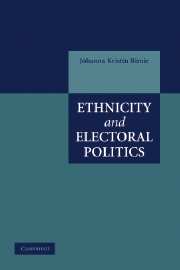Book contents
- Frontmatter
- Contents
- List of Tables and Figures
- Acknowledgments
- 1 Introduction: The Ethnic Effect
- 2 Ethnic Attractors
- 3 Ethnic Attractors and Exogenous Constraints
- 4 Ethnic Voting in Romania
- 5 Ethnic Voting and Party System Stability
- 6 Ethnic Politics and Access
- 7 The Ethnic Effect on Regime Stability
- 8 Conclusions
- Appendix A The Model (Formal Version)
- Appendix B Measurements and Other Methods Issues
- References
- Index
3 - Ethnic Attractors and Exogenous Constraints
Published online by Cambridge University Press: 03 December 2009
- Frontmatter
- Contents
- List of Tables and Figures
- Acknowledgments
- 1 Introduction: The Ethnic Effect
- 2 Ethnic Attractors
- 3 Ethnic Attractors and Exogenous Constraints
- 4 Ethnic Voting in Romania
- 5 Ethnic Voting and Party System Stability
- 6 Ethnic Politics and Access
- 7 The Ethnic Effect on Regime Stability
- 8 Conclusions
- Appendix A The Model (Formal Version)
- Appendix B Measurements and Other Methods Issues
- References
- Index
Summary
According to the argument of Ethnic Attractors, members of all ethnic groups have an incentive to support their group and are potentially peaceful participants in electoral politics as long as the group is represented in national decision making. This chapter explores the idea that the reason members of some ethnic groups fulfill the potential of stable but flexible participation and others do not is that ethnic groups in electoral politics are subject to barriers that aid or interfere with the group member's ability and willingness to fulfill this potential. The most significant of these barriers, according to the literature, are institutions. A further objective of this chapter is to generate testable implications about ethnic individual political behavior under a variety of exogenous constraints in both new and maturing democracies.
The principal determinants of the relative salience of the ethnic component of a voter's preferred policy package are the cohesion and importance of the ethnic cleavage. In other words, is the ethnic identification salient during democratization and does it remain relevant over time or lose importance when other aspects of the voter's identity take on increased importance, as the fluidity of ethnic identity implies may occur? Consequently, do ethnic voters have an initial incentive to vote for an ethnic party, and do they remain loyal to the ethnic party or migrate to other parties?
The preceding chapter argued that ethnic identity will emerge under divergent authoritarian and democratic conditions alike, wherever this organizational principle is useful.
- Type
- Chapter
- Information
- Ethnicity and Electoral Politics , pp. 41 - 59Publisher: Cambridge University PressPrint publication year: 2006



